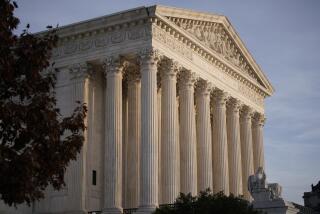Wardens Given Broad Powers Over Inmate Rights : Justices Let Prisons Curb Reading Materials, Visitors
- Share via
WASHINGTON — The Supreme Court on Monday gave prison officials broad powers to decide what inmates may read and who may visit them, ruling that the rights of prisoners depend largely on the wishes of their wardens.
The rulings, in two cases decided on 6-3 votes, reflect a gradual shift by the conservative court toward prison management’s duty to ensure security and away from prisoners’ rights to individual freedoms.
Because “the judiciary is ill-equipped to deal with the difficult and delicate problems of prison management, this court has afforded considerable deference to the determinations of prison administrators, who, in the interest of security, regulate the relations between prisoners and the outside world,” said Justice Harry A. Blackmun, who wrote the majority opinion in each case.
In the 1970s, federal courts frequently sided with inmates in suits challenging prison rules and conditions of confinement. Last year, two federal appellate courts ruled that prisoners have a constitutional right to obtain reading material and a right to have visitors.
However, the high court, which since 1987 has rejected claims by Muslim prisoners who wanted extra time for religious services and Missouri inmates who sought to exchange letters with other inmates, sent a strong message to judges that they should not second-guess the decisions of prison managers.
In one case, the high court overruled a District of Columbia appeals court decision in favor of Bureau of Prisons inmates who were demanding the right to receive a wide range of publications, including ones pertaining to revolutionary socialism, the American Nazi Party and homosexual themes. Other publications barred by prison management reported on alleged abuses suffered by inmates in other prisons.
The appeals court, citing a 1974 high court opinion, had found that authorities may not exclude those publications unless they can show a “likelihood” that the articles will provoke violence or disruption.
On Monday, the justices asserted that wardens may screen out publications if they “reasonably” believe the action will further “legitimate penological interests.” They sent the case (Thornburgh vs. Abbott, 87-1344) back to a judge to consider each of 46 disputed publications.
By the coincidence of the alphabet, the lead name on the original suit was Jack Abbott, an inmate with writing talent who became a cause celebre in the New York literary community in the late 1970s. After being paroled from prison through the efforts of authors such as Norman Mailer, Abbott stabbed an aspiring young actor outside a restaurant in 1981 and was put back behind bars.
The high court’s second ruling Monday said that prisoners do not have a constitutional right to have certain visitors.
Prison rules in Kentucky, growing out of an earlier lawsuit by inmates, say that the facilities will have an “open visiting policy.” But, when authorities denied further visits by family members who were suspected of smuggling in drugs, the inmates contended that their rights to “liberty” under the 14th Amendment had been violated.
Last year, an appeals court in Cincinnati agreed and said Kentucky officials must hold a full-fledged hearing before barring a visitor.
Officials in 32 states, including California, said this appellate decision, if upheld, would cause “an unworkable managerial nightmare” in their prison systems.
Blackmun, writing for the court, said that prison inmates have no such “liberty” right and that officials may exclude visitors whenever they believe it is necessary to do so (Kentucky vs. Thompson, 87-1815).
Edward Koren, an American Civil Liberties Union lawyer who represented the prisoners, said he was disappointed but not surprised by the rulings. “They are obviously intent on reducing the constitutional rights of prisoners,” Koren said.
Dissenting in both cases were Justices John Paul Stevens, William J. Brennan Jr. and Thurgood Marshall.
More to Read
Sign up for Essential California
The most important California stories and recommendations in your inbox every morning.
You may occasionally receive promotional content from the Los Angeles Times.














